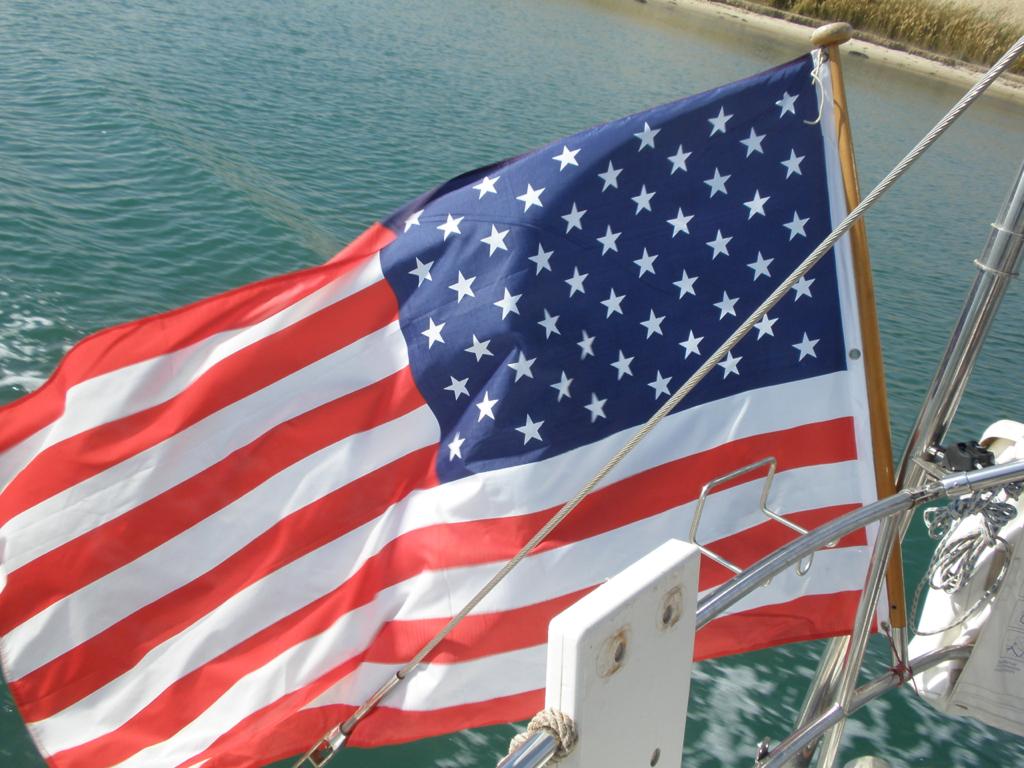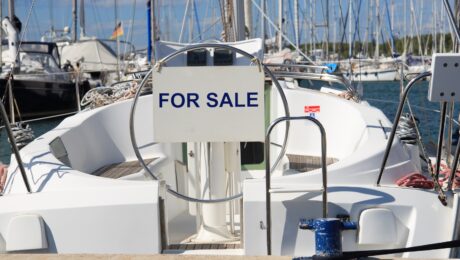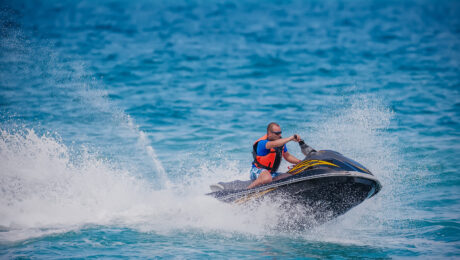This Independence Day, millions of people across the United States will take to the water to celebrate the founding of this country. Exploring our nation’s beaches, lakes, rivers, and waterways is a wonderful way to commemorate the holiday, but--as always--boating safety must remain a priority. With many more inexperienced boaters on the water, the likelihood of getting into an accident is high. Following are several aspects to be aware of, especially during the holiday, to ensure the safety and ultimate enjoyment for you and your crew this coming 4th of July.
Marine traffic and speed
As mentioned above - being on the water is probably the number one attraction for a summer holiday. Millions of Americans will either take their own boats out, or find a way to get on the water by taking a ferry ride, go on a 4th of July party boat or charter boats. Many will take on the water on board a PWC (Personal Watercraft, AKA: Jetski), or manually propelled vessels such as: kayaks, canoes, rowboats and stand up paddle boards. Add to that the traffic of barges and police boats around restricted security zones relating to fireworks displays - and we’ve got mayhem! Some local police authorities impose a max speed limit of 5 knots in their areas, and the general instruction to the public is to keep the speed to minimum in crowded areas.
In order for you to keep yourself and your crew safe, make sure to operate your vessel at a reasonable speed that will allow you to make quick adjustments such as course change or a complete stop. Keep in mind the main principles of the rules of the road:
- AVOID COLLISION AT ANY COST!
- Get out of the way of vessels that are less maneuverable
- Give way when overtaking other vessels
- Try to communicate effectively with other vessels by making your intentions clear, and be prepared to get out of the way when in doubt about the other vessel operators’ intentions
Boat capacity
In 2012 three children lost their lives after an overcrowded 34’ boat capsized during a 4th of July fireworks display in Oyster Bay, NY. The boat, which probably had a maximum capacity of 10 passengers, had 27 people on board. If you are not sure what is the maximum passenger capacity of your boat - now is the time to find out. Newer boats will have a decal displaying this number, and if you cannot find this number anywhere on board - check out the internet to find information about your boat’s capacity or boats at a similar size. If your boat can accommodate a larger number of passengers, assign crew to help you make sure everybody on board is feeling well and safe, and report back to you in case they recognize someone or something is wrong.
View the fireworks show on the water!
There is nothing more exciting than watching the fireworks from the water! The reflection of the lights on the water and off of city buildings is absolutely spectacular. If you and your crew are looking to experience this, make sure to be mindful of the darkness and other vessels:
- Make sure to have your navigation lights on and visible to other vessels
- Assign additional crew for lookout for other vessels
- Familiarize yourself with the security zones surrounding barges from which fireworks are being shot, stay away from them and follow police boat orders. The best way to find out information about the security zones in your boating area is through the US Coast Guard Local Notice to Mariners.
- Remember that darkness impairs your distant sight, and objects may seem either farther away or closer than in reality. Slow down and maintain a sharp lookout at all times.
Drink responsibly and keeping hydrated
Drinking and boating do not mix, and alcohol is not worth ruining your holiday and possibly your life and/or the lives of others. Boating under the influence is reckless and alcohol consumption is the leading factor in fatal boating accidents, accounting for around one-fifth of deaths.
There are many environmental stressors involved in boating that exacerbate the effects of alcohol. Imagine: the feeling of being on a boat in early July. The sun is high in the sky, creating a glare on the water and beads of sweat on your body. Perhaps the engine is loud, or the wind is strong enough that it’s challenging to hear others on board the craft. You and your loved ones are enjoying the cool blue water by swimming, water skiing, and taking turns jumping from the swim platform. It’s tons of fun, but you’re probably not drinking enough fluids to keep up with all the energy you are expending--resulting in dehydration.
All of the above-mentioned features are environmental stressors, which engender fatigue and lack of alertness. Add alcohol consumption to environmental stressors and you have a cocktail for disaster. The liver needs energy and water to function, so dehydration slows down your body’s ability to process alcohol. This means that your blood alcohol concentration (BAC) after two or three beers during a day of boating may be significantly higher than you would anticipate. This results in impaired judgment and slow reaction time--not qualities you want in a helmsman operating a vessel full of your loved ones in a crowded body of water.
If you are going to commit to helmsman’s duties this holiday, then you should be responsible and choose to leave your 6-pack at home. Time spent enjoying the water with loved ones brings enough joy, light, and fun to make up for it.
An Overview
- The legal blood alcohol concentration (BAC) limit for operating a boat is the same as that for operating a motor vehicle: 0.08% g/dL. Your BAC may be higher than anticipated due to environmental stressors.
- Blood alcohol level laws apply to operation of any vessel, including canoes, kayaks, and sailboats.
- Heat, glare, loud noises, and dehydration are all environmental stressors that augment the impact of alcohol.
- Pack plenty of water and electrolyte solutions to keep you and your passengers hydrated on board. Snacks are never a bad idea either.
- Keep a close eye on the alcohol consumption of your passengers. Alcohol is a leading factor in the majority of man overboard situations.
Be safe and have fun
Remember: the Coast Guard will not hesitate to take you off the water if they find your behavior reckless. In the event of a boating accident you may even be prosecuted with a felony charge. Boat operators must treat driving a boat with the same caution and care they exhibit in operating a motor vehicle. When drinking and driving, you not only risk losing your boating license, but also risk the lives of everyone on board your vessel. For those interested in learning more about safety, there are boating safety courses available online or at your local community college. For now, get out there! Feel open to and excited about all the fun to be had on the water this holiday season, and rest easy knowing that the lives of everyone on board are safe in your sober hands.


